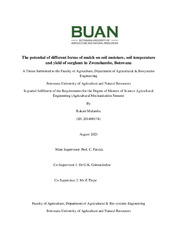The potential of different forms of mulch on soil moisture, soil temperature and yield of sorghum in Zwenshambe, Botswana
Abstract
Due to climate change, rainfed arable conditions have become quite unpredictable in semi-arid conditions of Botswana. Several countries have been experimenting with different climate smart technologies with a view to find suitable ones for the continued production of staple food crops such as sorghum. Conservation Agriculture (CA) which incorporates three practices (minimum soil disturbance, mulching and crop rotations) has received a lot of interest as one of the promising climate smart initiatives. A study to explore the effect of mulching within CA on the production of field crops was undertaken in Zwenshambe which is located at 200 30’21.38’’S latitude and 270 26’9.32” E longitude in the North East District of Botswana in Southern Africa. The site has an estimated terrain elevation above sea level of 1261 meters. The soils are sandy loam with a few stones. The natural vegetation is mainly mophane wood land with a few acacia species with mostly Eragrostis lehmanniana grass and a few patches of cynodon dactylon. The specific objectives of the study were to determine the effect of 4 different mulches on soil temperature, soil moisture retention and biomass yield of sorghum. The study consisted of 5 treatments namely: i) no mulch as the control, ii) maize straw mulch (Zea mays) iii) Grass mulch (Eragrostis lehmanniana), iv) Mophane leaves and v) Orange plastic mulch (250µm).A Complete randomised Block Design was used with each treatment having 4 plots measuring 6m × 4m. Soil temperature was measured using soil thermometer of range -10 to 500 c at a depth of 10cm every 2 weeks. Gravimetric soil moisture measurements were taken every 2 weeks by collecting one soil sample from each plot using a spade at a depth of 10cm. The biomass yield of sorghum was recorded at the end of 90day from sowing seeds. Despite variations to soil temperature and soil moisture retention effects by the different treatments, none of the mulches displayed any significant differences at (p < 0.05). The means for soil temperature under the different mulches were no-mulch-26.13 0C , mophane leaves and twigs-26.75 0C, Orange plastic mulch-26.84 0C, grass mulch-26.16 0C and maize straw mulch26.06 0C while means for soil moisture retention were no-mulch-1.98%, mophane leaves and twigs-2.18%, orange plastic mulch-2.39%, grass mulch-2.04% and maize straw mulch1.96%.The orange plastic mulch and mophane leaves and twigs mulch (colophospermum mopane) significantly (p < 0.05) increased the biomass yield of sorghum. The means for yield were no-mulch-43.65g/m2 , mophane leaves and twigs mulch-67.68g/m2 , orange plastic mulch72.43g/m2 , grass mulch-50.73g/m2 and maize straw mulch-33.83g/m2 . Means were separated using LSD.
Collections
- Theses and Dissertations [133]

